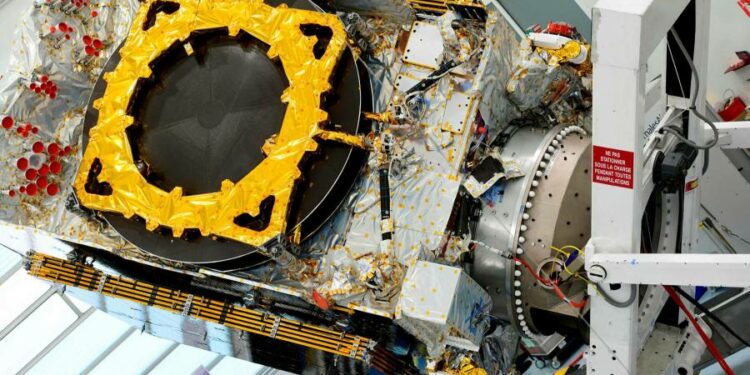French satellite operator Eutelsat has confirmed it is in discussions to acquire smaller rival OneWeb in an all-share deal designed to help the groups challenge billionaire space entrepreneurs Elon Musk and Jeff Bezos.
Under the terms being discussed, the OneWeb and Eutelsat tie-up is being branded as a merger of equals with each set of shareholders ending up with 50 per cent of the combined company. OneWeb shareholders would tender their shares to Eutelsat in exchange for Eutelsat shares.
Eutelsat’s share price tumbled more than 17 per cent to €8.60 on Monday after the statement as investors balked at the prospect of a deal.
If completed, the combination would address Eutelsat’s need for growth to offset a declining satellite video business and OneWeb’s requirement for $2bn to $3bn in investment to complete its network and update its technology, according to people close to the talks.
“The transaction would represent a logical next step in the successful partnership between Eutelsat and OneWeb,” said Eutelsat, which bought a 23 per cent stake in OneWeb in 2021.
But Markus Kaussen, an analyst at Swiss asset manager BWM, which is a top-15 shareholder in Eutelsat, said a deal would “turn the investment case [for Eutelsat] 180 degrees”.
“Right now, it is a boring value stock for income-oriented investors with high free cash flow and high dividends,” he said. “If it were to merge with OneWeb, it would become a growth business hoping that an expensive bet will pay off in the future, rather than an established business with known economics.”
The French state owns a 19.9 per cent stake in Eutelsat, while the UK owns less than 18 per cent of OneWeb after bringing the company out of bankruptcy in 2020. Both are expected to keep significant shareholdings.
Before the sharp fall in Eutelsat’s shares, officials told the Financial Times at the weekend that the deal valued the UK government’s OneWeb stake at $600mn, a paper profit of $100mn.
But since the transaction is an all-share merger of equals, the drop in Eutelsat’s shares means almost all of those paper profits have been wiped out.
A merger would relieve the UK government of any responsibility for the sizeable investment still required to complete OneWeb’s business plan.
The deal would also be a sign of how European satellite participants, backed by governments who see space communications as a strategic industry, are trying to keep up with billionaire entrepreneurs such as Musk.
His company SpaceX has funded disruptive satellite projects using different technology known as lower-earth orbit (LEO) satellites rather than the geostationary orbit ones that Eutelsat has long used. LEO satellites can deliver connections with fewer delays since they are closer to earth.
OneWeb was a pioneer with its own LEO constellation, but now needs huge investment to keep up with SpaceX’s newer technology.
The deal is subject to a shareholder vote at Eutelsat and regulatory approvals.
Kaussen said BWM was still evaluating the deal and had not yet come to a final conclusion.
Analysts said the Eutelsat share price drop could reflect disappointment that the group would be devoting cash to the deal and less to shareholder returns.
Deutsche Bank analyst Roshan Ranjit wrote in a note that “industry consolidation remains a key thematic” in the satellite sector “given volumes of new capacity being launched (SpaceX’s Starlink, Amazon’s Project Kuiper and Telesat’s Lightspeed), and the decline of legacy broadcast”.
On Monday, the UK competition regulator opened an investigation into California-based satellite company Viasat’s takeover of Britain’s Inmarsat, announced last year, which created one of the world’s biggest space-based broadband providers.
The Competition and Markets Authority said in an update that it was considering whether the deal could result in a substantial lessening of competition.
The regulator, which has not yet opened a formal “phase 1” merger probe, asked for comments from interested parties by August 15.











